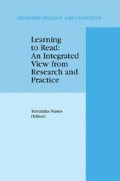Abstract
It is of the greatest importance that children make a good start in learning to read. Once children fall behind, it becomes increasingly difficult for them to catch up, as their peers read more and forge ahead in all areas of the curriculum (e.g., Stanovich, 1986). So it is important to get the classroom programme right from the start. Especially in inner city schools, the child’s experience in school may be critical. Children from poorer homes are more likely to come to school with a more limited experience of books and fewer reading skills. They tend to start behind the other children and make slower progress. They rely heavily on school for their literacy experiences.
Access this chapter
Tax calculation will be finalised at checkout
Purchases are for personal use only
Preview
Unable to display preview. Download preview PDF.
References
Adams, M.J. (1990). Beginning to read: Learning and thinking about print. Cambridge, MA: The MIT Press.
Barr, R. and Dreeben, R. (1983). How schools work. Chicago: Chicago University Press.
Bauman, J.F. (1983). A generic comprehension instructional strategy. Reading World, 2, 167–177.
Bauman, J.F. (1984). The effectiveness of a direct instruction paradigm for teaching main idea comprehension. Reading Research Quarterly, 20, 93–111.
Blatchford, P., Ireson, J. and Joscelyne, T. (1994). The initial teaching of reading: What do teachers think? Educational Psychology, 14(3), 331–344.
Brooks et al. (1992). What teachers in training are taught about reading. Slough: National Foundation for Educational Research.
Brophy, J. (1979). Teacher behavior and its effects. Journal of Educational Psychology, 71(6), 733–750.
Clay, M.M. (1985). The early detection of reading difficulties: A diagnostic survey with recovery procedures, 3rd edition. Auckland, New Zealand: Heinemann.
Department of Education (1995). English in the national curriculum. London: HMSO.
Department of Education and Science (1988). The new teacher in school. London: HMSO.
Department of Education and Science, Alexander, R., Rose, J. and Woodhead, C. (1992). The curriculum organisation and classroom practice in primary schools. London: HMSO.
Donaldson, M. (1993). Sense and sensibility: Some thoughts on the teaching of literacy. In R. Beard (Ed.), Teaching literacy balancing perspectives (pp. 47–56). Hillsdale, NJ: Lawrence Erlbaum.
Goddard, N. (1974). Literacy: Language-experience approaches. London: MacMillan.
Good, T. (1979). Teacher effectiveness in the elementary school. Journal of Teacher Education, 30(2), 53–64.
Goodman, K.S. (1970). Reading: A psycholinguistic guessing game. In H. Singer and R.B. Ruddell (Eds.), Theoretical models and processes of reading. Newark, DE: International Reading Association.
Hatcher, P., Hulme, C. and Ellis, A.W. (1994). Ameliorating early reading failure by integrating the teaching of reading and phonological skills: The phonological linkage hypothesis. Child Development, 65, 41–57.
HMI (1991). The teaching and learning of reading in primary schools: A report by Her Majesty’s Inspectors. London: DES.
Ministry of Education (1991). Reading in junior classes. Wellington, New Zealand: Learning Media.
OFSTED (1993). Reading recovery in New Zealand: A report from the office of Her Majesty’s Chief Inspector of Schools. London: HMSO.
OFSTED (1996). Teaching of reading in 45 inner London primary schools: A report by Her Majesty’s Inspectors in collaboration with the LEAs of Islington, Southwark and Tower Hamlets. London: HMSO.
Plewis, I. and Veltman, M. (1995). Where does all the time go? Changes in pupils’ experiences in Year 2 classrooms. In M. Hughes (Ed.), Teaching and learning in changing times. Oxford: Blackwell.
Smith, F. (Ed.) (1973). Psycholinguistics and reading. New York: Holt Rinehart and Winston.
Stanovich, K.E. (1986). Matthew effects in reading: Some consequences of individual differences in the acquisition of literacy. Reading Research Quarterly, 21(4), 360–406.
Sylva, K. (1997). Target child observation. In K. Sylva and J. Stevenson (Eds.), Social Behaviour and Competence in Children. Slough: NFER-Nelson.
Tizard, B., Blatchford, P., Burke, J., Farquhar, C. and Plewis, I. (1988). Young children at school in the inner city. Hove and London: Lawrence Erlbaum.
Editor information
Editors and Affiliations
Rights and permissions
Copyright information
© 1999 Springer Science+Business Media Dordrecht
About this chapter
Cite this chapter
Hurry, J., Sylva, K., Riley, J. (1999). Focused Literacy Teaching at the Start of School. In: Nunes, T. (eds) Learning to Read: An Integrated View from Research and Practice. Neuropsychology and Cognition, vol 17. Springer, Dordrecht. https://doi.org/10.1007/978-94-011-4826-9_18
Download citation
DOI: https://doi.org/10.1007/978-94-011-4826-9_18
Publisher Name: Springer, Dordrecht
Print ISBN: 978-0-7923-5992-0
Online ISBN: 978-94-011-4826-9
eBook Packages: Springer Book Archive

